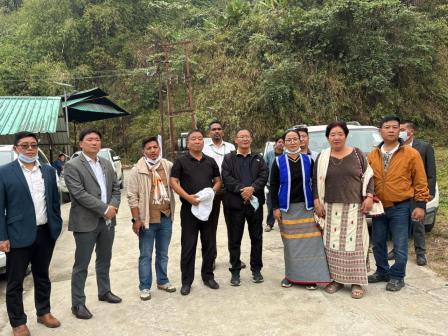-
COPU reviews state PSUs in second sitting
-
CM stresses on strong internal security, tech-driven policing
-
Cabinet approves proposals aimed at strengthening governance, enhancing public…
-
Body found hanging at bus stop with limbs tied sparks…
-
Mein chairs pre-budget consultative meeting with community based organisations
-
District level training on Census of India 2027 begins at…
-
WCD Minister reiterates commitment to safeguarding rights, dignity of…
-
Woman loses life in massive fire, two children seriously injured
-
 UA Minister inspects burial ground, focuses on maintenance and improvement
UA Minister inspects burial ground, focuses on maintenance and improvement
-
 UA Minister inspects burial ground, focuses on maintenance and improvement
UA Minister inspects burial ground, focuses on maintenance and improvement
All focus till now has been on improving healthcare facilities in the state but the important aspect of safe disposal of bio-medical waste has been given little or no thought at all, writes Jun Taki whilst arguing that government can no longer turn a blind eye to fatal wastes.
Every year hundreds of people are injured from improperly discarded sharps like needles, syringes and lancets; in turn such injuries transmit blood borne pathogens such as HIV and Hepatitis B and C; despite such high risk, it’s a pity, the health authorities in the state are yet to pay attention to the problem of bio-medical waste.
The mushrooming of hospitals and health care facilities in the state especially in the capital complex has no doubt made healthcare accessible to people but it has also increased the production of hospital waste or bio-medical waste (BMW) that are currently being dumped in shallow pits which are later burnt off. This method, as evident, is not without risks as often anatomical wastes gets exposed when stray dogs and pigs dig it out in search of food.
‘Incinerating medical waste is one of the most important challenges the state is facing with no BMW treatment facility in the state,’ says Microbiologist at the Arunachal State Hospital, Mope Riba.
Recall that India was among the first countries to implement biomedical waste management rules in 1998 yet, whole of Arunachal Pradesh is without a single incinerator for safe disposal of medical wastes.
The state’s premier hospital, the Arunachal State Hospital (ASH) till recently had a non-functional incinerator which was later demolished for construction of new building for the hospital. The ASH like many others was dumping BWM in their compound before delegating the work to local contractors through tender. The contractors now collect the waste and dispose it off outside the city.
Without any incinerating facilities, Private drug stores, pharmacies and diagnostic centres across state are, at best, burning such waste and later dispose off in nearby rivers. This act is a huge compromise on both the environment but health of its residents.
‘A mega BMW treatment facility in the capital is urgently required and state government should work on its implementation to control medical waste management. If the state does not act in time it will become a major hazardous risk to general public in near future,’ says Medical Superintendent, Heema Hospital Itanagar, Dr Kesang W Thongdok.
The RK Mission hospital has a far better mechanism worked out to see to tackle the problem. One autoclave machine is provided in every section of the Out Patient Department and the hospital has installed two incinerator machines. Coloured buckets in every ward ensures proper disposal of different types of waste like normal waste, syringes and needles, glass product and BMW. A month ago, a more advanced incinerator was installed in the Hospital which is being used for treating all bio and common medical waste generated from the hospital.
Devajit Kalita of RK Mission Hospital informed that the current machine was purchased by the RK Mission authority without any government fund. ‘Every year Arunachal Pollution Control Board makes inspection regarding disposal of Medical Waste and we are working within the guidelines of the Board,’ he added.
In view of the sharp increase in hospital wastes and many small facilities not being able to afford expensive incinerating machines, there is a growing call for a common bio-medical waste treatment facility in the capital to enable all dispensaries and health centres to avail the services.
There is need for more coordination between hospitals, municipal officials and pollution control board to check one of the biggest challenges in the health sector now; they no longer can turn a blind eye on this issue which has major environmental and health implications.

Kenter Joya Riba
(Managing Editor)She is a graduate in Science with post graduation in Sociology from University of Pune. She has been in the media industry for nearly a decade. Before turning to print business, she has been associated with radio and television.
Email: kenterjoyaz@easternsentinel.in / editoreasternsentinel@gmail.com
Phone: 0360-2212313

